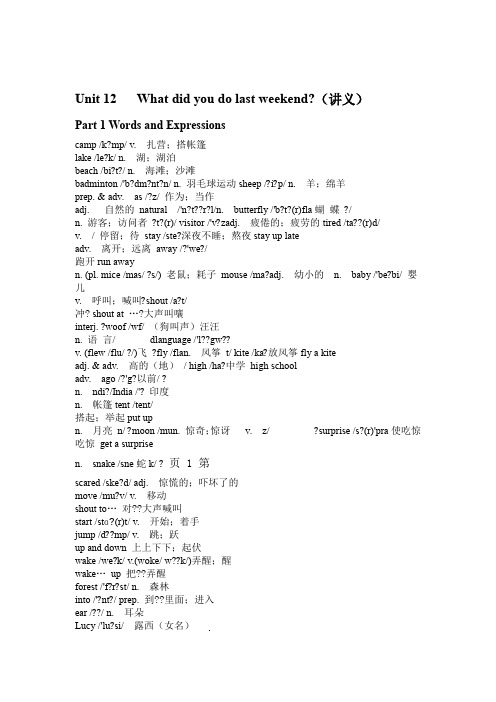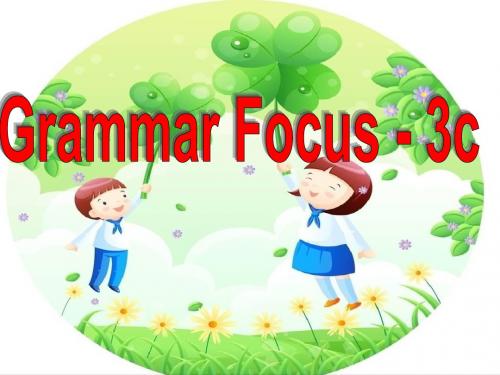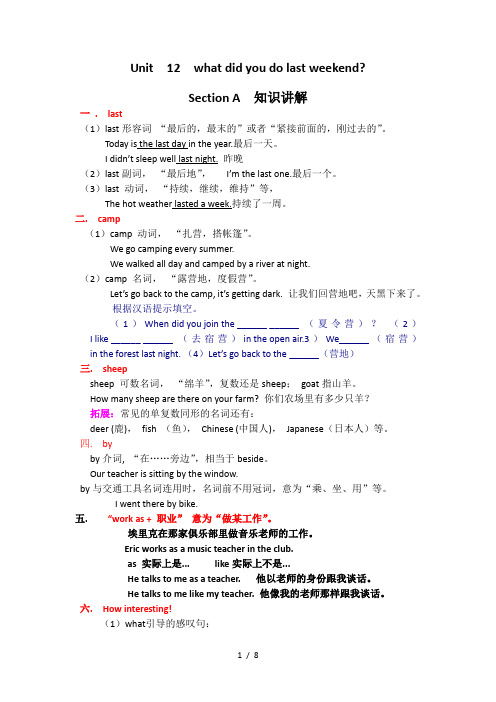Unit 12 What did you do last weekend Section B
- 格式:ppt
- 大小:3.02 MB
- 文档页数:13

Unit 12 What did you do last weekend?知识强化一、知识概述1.学习和掌握本单元出现的生单词、词组和句型。
2.继续学习和巩固动词的一般过去时用法。
3.学习一般过去时的特殊疑问句用法。
二、语音知识:Listen and read. Notice the change in the past forms.三、单元重难点解析1.词汇篇:do my homework——went to the cinemago boating——camped by the lakego to the beach——played badmintonsing and play the guitar——went to the libraryswim in a swimming pool——studied for a testhave dinner with friends——flew a kitesit under the moon——told each other storiesgo to sleep—2.What did you do last weekend, Lucy?露西,上周末你做了什么?这个句子是谓语动词是实义动词的一般过去时的特殊疑问句用法。
特殊疑问词+did+主语+动词原形+其它?e.g.What did you do last night?昨天晚上你做了什么?Where did he go last Sunday?上个星期天他去哪儿了?Who did she go with?她和谁一起去的?注意:(1)当特殊疑问词是充当主语时,则不需要使用助动词did,直接用特殊疑问词加动词的过去式来表达就可以了。
e.g.Who visited her grandma?谁拜访了她的奶奶?(2)当句子的谓语动词是be动词was/were时,特殊疑问句的结构为“特殊疑问词+ was/were +其它?”e.g.How was your weekend?你周末过得如何?How was the weather in Beijing?那时候北京天气如何?3.How interesting! [译文]多么有趣啊!这是个感叹句。

Unit 12 What did you do last weekend?(讲义)Part 1 Words and Expressionscamp /k?mp/ v. 扎营;搭帐篷lake /le?k/ n. 湖;湖泊beach /bi?t?/ n. 海滩;沙滩badminton /'b?dm?nt?n/ n. 羽毛球运动sheep /?i?p/ n. 羊;绵羊prep. & adv. as /?z/ 作为;当作adj. 自然的natural /'n?t??r?l/n. butterfly /'b?t?(r)fla蝴蝶?/n. 游客;访问者?t?(r)/ visitor /'v?zadj. 疲倦的;疲劳的tired /ta??(r)d/v. / 停留;待stay /ste?深夜不睡;熬夜stay up lateadv. 离开;远离away /?'we?/跑开run awayn. (pl. mice /mas/ ?s/) 老鼠;耗子mouse /ma?adj. 幼小的n. baby /'be?bi/ 婴儿v. 呼叫;喊叫?shout /a?t/冲? shout at …?大声叫嚷interj. ?woof /wf/ (狗叫声)汪汪n. 语言/ dlanguage /'l??gw??v. (flew /flu/ ?/)飞?fly /flan. 风筝t/ kite /ka?放风筝fly a kiteadj. & adv. 高的(地)/ high /ha?中学high schooladv. ago /?'g?以前/ ?n. ndi?/India /'?印度n. 帐篷tent /tent/搭起;举起put upn. 月亮n/ ?moon /mun. 惊奇;惊讶v. z/ ?surprise /s?(r)'pra使吃惊吃惊get a surprisen. snake /sne蛇k/ ?页 1 第scared /ske?d/ adj. 惊慌的;吓坏了的move /mu?v/ v. 移动shout to…对??大声喊叫start /stɑ?(r)t/ v. 开始;着手jump /d??mp/ v. 跳;跃up and down 上上下下;起伏wake /we?k/ v.(woke/ w??k/)弄醒;醒wake…up 把??弄醒forest /'f?r?st/ n. 森林into /'?nt?/ prep. 到??里面;进入ear /??/ n. 耳朵Lucy /'lu?si/ 露西(女名)wake v.(woke/ w??k/)弄醒;醒wake…up 把??弄醒The shouting waked up Jim.The shouting waked Jim up.Please wake me up at five.wake…up 名词作其宾语,放在或均可,。

Unit12 What did you do last weekend?句子词汇精讲【重点短语】1. last weekend 上周末2. go to the cinema 看电影3. go boating 去划船4. camp by the lake 在湖边露营5. go to the beach 去海滩6. study for the English test 为了英语考试学习7. feed some cows 喂一些奶牛8. work as a guide 做导游工作9. over 200 kinds ofbutterflies 超过200多种蝴蝶10. living habits 生活习惯11. be kind of tired 有点儿累12. stay up 熬夜13.as a special gift 作为一个特殊的礼物14. put up the tents 搭建帐篷15. make a fire 生火16. keep sb. warm 使某人保持温暖17.so...that... 如此…以至于…18. get a surprise 吃惊19. see sb. doing sth. 看见某人正在做某事20. jump up and down 上蹦下跳21. climb onto one’s back 爬到某人背上22. shout at/shout to 大声喊叫23. wake …up 把...弄醒24. a useful lesson 有用的一课1.by the lakeby介词, 意为“在……旁边”,表示位置,相当于beside。
拓展:by作介词的其他常见用法:(1)表示移动方向,意为“经过”。
例如:My mother goes by the building every day. 我妈妈每天从这栋楼旁边经过。
(2)表示方式及手段,意为“用,靠,通过”。
He makes a living by fishing. 他以捕鱼为生。


Unit 12 what did you do last weekend?Section A 知识讲解一. last(1)last形容词“最后的,最末的”或者“紧接前面的,刚过去的”。
Today is the last day in the year.最后一天。
I didn’t sleep well last night. 昨晚(2)last副词,“最后地”,I’m the last one.最后一个。
(3)last 动词,“持续,继续,维持”等,The hot weather lasted a week.持续了一周。
二. camp(1)camp 动词,“扎营,搭帐篷”。
We go camping every summer.We walked all day and camped by a river at night.(2)camp 名词,“露营地,度假营”。
Let’s go back to the camp, it’s getting dark. 让我们回营地吧,天黑下来了。
根据汉语提示填空。
(1)When did you join the ______ ______ (夏令营)?(2)I like ______ ______ (去宿营)in the open air.3)We______(宿营)in the forest last night. (4)Let’s go back to the ______(营地)三. sheepsheep 可数名词,“绵羊”,复数还是sheep;goat指山羊。
How many sheep are there on your farm? 你们农场里有多少只羊?拓展:常见的单复数同形的名词还有:deer (鹿),fish (鱼),Chinese (中国人),Japanese(日本人)等。
四. byby介词, “在……旁边”,相当于beside。
Our teacher is sitting by the window.by与交通工具名词连用时,名词前不用冠词,意为“乘、坐、用”等。

Unit 12 What did you do last weekend(讲义及答案)Unit 12 What did you do last weekend?(讲义)Part 1 Words and Expressionscamp /kæmp/ v. 扎营;搭帐篷lake /leɪk/ n. 湖;湖泊beach /biːtʃ/ n. 海滩;沙滩badminton /'bædmɪntən/n. 羽毛球运动sheep /ʃiːp/ n. 羊;绵羊as /æz/ prep. & adv. 作为;当作natural /'nætʃərəl/adj. 自然的butterfly /'bʌtə(r)flaɪ/ n. 蝴蝶visitor /'vɪzɪtə(r)/n. 游客;访问者tired /taɪə(r)d/adj. 疲倦的;疲劳的stay /steɪ/ v. 停留;待stay up late 深夜不睡;熬夜away /ə'weɪ/ adv. 离开;远离run away 跑开mouse /maʊs/ n. (pl. mice /maɪs/) 老鼠;耗子baby /'beɪbi/ adj. 幼小的n. 婴儿shout /ʃaʊt/ v. 呼叫;喊叫shout at …冲……大声叫嚷woof /wʊf/ interj. (狗叫声)汪汪language /'læŋgwɪdʒ/ n. 语言fly /flaɪ/ v. (flew /fluː/)飞kite /kaɪt/ n. 风筝fly a kite 放风筝high /haɪ/ adj. & adv. 高的(地)high school 中学ago /ə'gəʊ/ adv. 以前India /'ɪndiə/n. 印度tent /tent/ n. 帐篷put up 搭起;举起moon /muːn/ n. 月亮surprise /sə(r)'praɪz/ n. 惊奇;惊讶v. 使吃惊get a surprise 吃惊snake /sneɪk/ n. 蛇开始做某事surprise n. 惊奇;惊讶v. 使吃惊You didn’t know my surprise when I he ard that news.My sister and I got a terrible surprise yesterday.get a surprise 吃惊Jimmy’s words surprised me a lot.It surprised us to see Jane get up soearly. surprise sb. 使……吃惊n. 意想不到的事;惊喜It’s a lovely surprise to see youagain. I have a little surprise foryou.shout v. 呼叫;喊叫There’s no need to shout. I am notdeaf! We could hear them shoutingfor help. shout at…s hout to…The bus driver is shouting at the oldman. Don’t shout at me. I don’t likethat.I had to shout to Tom because he was so far from me.My mother shouted to me on the other side of the road, but I still couldn’t hear her w ords.shout at…对……叫嚷,多指因shout to…对……喊,多指因Part 2 Role-playRole-play the conversation.Paul: Hi, Lisa. How was yourweekend? Lisa: Great, thanks.Paul: What did you do?Lisa: I worked as a guide at the Natural HistoryMuseum. Paul: Really? How interesting!Lisa: Yeah, it was fun. They have butterfly house with over 200 kinds of butterflies! I told the visitors about themand their living habits. Did you have a good weekend? Paul: Yeah, it was good, but I’m kind of tired now. I stayed up late to watch the soccer game.How interesting!Look at the bird. How beautiful!I had a terrible weekend. How tired!Five hours ago we left Beijing on this train, but now we’re arriving in Shanghai! How fast!I got on the bus one hour ago. How slowly!how 引导感叹句,译为“多么……;真……”,后面接或。
七年级英语下册Unit12Whatdidyoudolastweekend知识点七年级英语下册Unit12Whatdidyoudolastweekend知识点一.短语归纳1.domyhomework做作业2.gotothecinema去看电影3.goboating去划船4.bythelake在湖边5.gotothebeach去海滩6.playbadminton打羽毛球7.visitmygrandma看望我奶奶8.studyfortheEnglishtest为英语测验而学习备考9.theNaturalHistoryMuseum自然历史博物馆10.kindsof各种各样的11.livinghabits生活习惯12.stayup深夜不睡,熬夜13.giveback归还14.playtheguitar弹吉他15.gotothelibrary去图书馆16.inaswimmingpool在游泳池里17.shoutat…冲……大声叫嚷18.highschool高中,中学19.flykites放风筝、20.gocamping去野营21.putup搭建22.makeafire生火23.tellstories讲故事24.eachother互相25.gotosleep入睡26.getasurprise吃惊27.shoutto…呼喊……喊叫……28.upanddown来来回回;上上下下29.wake…up把……弄醒31.onSaturdaymorning在星期六早上32.haveagoodweekend周末过得愉快33.thenextmorning第二天早上34..runaway跑开35.moveinto…移进…二.用法集萃1.go+doing去做某事2.play+球类玩……球3.时间段+ago……前 4.keep+sb./sth.+形容词/副词/介词短语使……保持……5.so+形容词/副词+that句子如此……以至于……6.seesb.doingsth.看见某人正在做某事7.letsb.dosth.让某人做某事8.starttodo/doingsth.开始做某事三.重点句型1.—Whatdidyoudolastweekend?—Ididmyhomework.—上个周末你做了什么了?—我做我的家庭作业了。
Unit 12 What did you do last weekend?词汇精讲1. last(1)last 作形容词时,意为“最后的,最末的”或者“紧接前面的,刚过去的”。
例如:Today is the last day in the year. 今天是今年的最后一天。
I didn’t sleep well last night. 昨晚我没睡好。
(2)last作副词时,意为“最后地”,例如:I’m the last one. 我是最后一个。
(3)last 做动词时,意思是“持续,继续,维持”等,例如:The hot weather lasted a week. 炎热的天气持续了一周。
2. as(1)as作介词时意为“作为”,其后多接表示职业、职务、用途、作用之类的名词。
例如:He works as a worker. 他作为一名工人而工作。
I used one of my shoes as a hammer. 我拿我的一只鞋当锤子使。
(2)as还可以作连词,其后多接从句或介词短语。
例如:All the six students do as the teacher says. 所有这六个学生都按照老师说的做。
3. camp(1)camp 作动词,意为“扎营,搭帐篷”。
例如:We go camping every summer. 我们每年夏天都去野营。
We walked all day and camped by a river at night.我们走了一天,晚上在一条河边宿营。
(2)camp 作名词,意为“露营地,度假营”。
例如:Let’s go back to the camp, it’s getting dark. 让我们回营地吧,天黑下来了。
We spent two weeks at camp this summer. 我们今年夏天在度假营玩了两周。
4. sheepsheep 可数名词,意为“绵羊”,它的复数还是sheep;而goat侧重指山羊。
七下Unit 12 What did you do last weekend?一、Important Phrases:1.go to the cinema 去影院★=go to the movies2.go boating/camping 去划船/野营★summer camp 夏令营3.camp by the lake 在湖边野营★by the pool在池边4.go to the beach 去海滩★on the beach 在沙滩上5.play badminton 打羽毛球play+球类/棋类名词(不加冠词)6. study for the test 备考★test=exam7.feed some sheep/cows喂羊/牛★feed(fed)on...以..为食,feed with...用...喂养8. work as a guide 做导游工作★work as +职业从事某工作9. at the Natural History Museum 自然历史博物馆★nature(n.不可数)大自然-natural(adj.)自然的10. over 200 kinds of butterflies 200多种蝴蝶★over=more than 超过11.living habits 生活习惯★make a living 谋生;eating habits饮食习惯12.kind of tired 有点累★kind of = a little13. stay up late 熬夜★stay at home 待在家,stay away from 远离,lately(adv.)最近地14.sleep early 早睡★sleepy 困的,asleep睡着的15.a family of mice 老鼠一家★mouse(单)-mice(复)16.be afraid of sth./to do 害怕★afraid=scared17.run away 跑开★take away 带走,put...away 把某物收拾好,give away 捐赠18. climb onto one’s back 爬上某人的背19. shout at/to sb.冲某人大叫★shout out 大喊出20. a second language 第二语言★mother tongue 母语21.fly a kite放风筝22.do something interesting 做有趣的事★修饰不定代词,adj.后置:anything special23.finish high school 中学毕业★finish doing sth 完成做某事24.a special gift一特殊礼物★gift=present25.take us to India 带我们去印度26.take a long bus ride 坐很久的公交车27.put up our tents 搭帐篷★put up:搭建,举起,张贴28.make a fire生火29.cook food on the fire 在火上做饭★on an open fire 明火,篝火30.tell cach other stories 互相讲故事★tell a lie 说谎,tell a joke 讲笑话31.keep sb.warm 使某人保持暖和32.sit under the moon 坐在月光下★moonlight月光,moon cake月饼33.so.......that.......如此...以致于...34.get a surprise 吃惊35. look out of...向外看★look out 小心,look for寻找,look after 照顾36. jump up and down 跳上跳下37. move into the forest 进入森林38. wake sb up叫醒某人★wake up醒来,awake醒着的39. read a book about history 读一本历史书★read...to sb给某人读...40.see an interesting talk show 看有趣的脱口秀二、Key Language Points:1.Where did you go last weekend? What did you do last weekend?上周末你去了哪里?上周末你做了什么?一般过去时的特殊疑问句:1)特殊疑问词+did+主语+v.(原)+其他?如疑问词作主语,则陈述语序,如:Who bought you this new dress?谁给你买的新裙子?2)特殊疑问词+was/were+主语+其他?Where were you last night?昨晚你在哪里?2.----Who visited her grandma? -----Becky did.为避免重复,常用do,does,did,so等代替前文提到的内容。